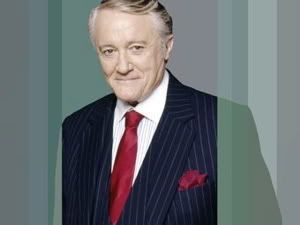
Sometimes you just feel you’re in the presence of great knowledge when you talk to someone.
Robert Vaughn has a list of film and television credits that span fifty years and spans multiple generations of people who grew up consuming television. I happen to be one of those people and it wasn’t until the A-TEAM came on in the 80’s when I was introduced to not only Robert but to the kind of history he brings to every production he’s in. Whether it’s acting alongside Mr. T or Steve McQueen or even modern day Gen X actors who are major talents across the pond there are just some things you’re never going to get around asking someone who has seen it all.
And Robert has.
From series that didn’t so well to the ones that did, Robert just will not relent. And it was this sense of enduring determination that has allowed him to strike ratings gold with his long successful series on the BBC with HUSTLE, a program that has finally found an outlet here, stateside, through AMC. Equal parts OCEAN’S ELEVEN, THE STING and a whole lot of snappy writing from the minds that brought the equally successful MI-5 to Americans, HUSTLE brims with intelligence while giving plenty enough to those who are in the mood for a show about modern day Robin Hoods. The show is fast, quick-paced and with four seasons equaling a total of 24 episodes you’re able to catch up with these cats in no time at all.
Robert spoke to me regarding the show, his take on the state of modern television and how much longer he intends on staying in front of the camera.
All four seasons can now be seen playing on AMC every Wednesday night at 10/9C and are now available to be purchased on DVD.
CHRISTOPHER STIPP: Great series. I only learned about HUSTLE a week ago and…
[Laughs]
ROBERT VAUGHN: Really? It’s been out for four years.
STIPP: I just don’t happen to live in England and haven’t heard anything about the series being brought over on AMC. I did want to say that the show is quite excellent and the fact that there are four seasons now on AMC really gives people a chance to get ensconced with what’s happening. I am curious to know, if you can answer it, why a full season represents six episodes on the BBC?
VAUGHN: Quite simply, that’s all the United Kingdom can afford, in terms of producing a series to try it out. Let’s say here you shoot a pilot and someone feels strongly about it, really strong about it, they’ll order 22 more. Well, in Britain, the BBC has much lower budgets. They have to wait until they have a group of shows that total 24 before they can sell it internationally. It’s what they’ve done with us. It’s playing all over the Orient, Africa, Eastern Europe and so on.
STIPP: It’s seems like it is here where if you can make it to five seasons, that’s the goal for any television show.
VAUGHN: Right. And AMC didn’t buy HUSTLE for four seasons. They bought three seasons and the fourth one was completed in time for them to show it last year.
STIPP: And what was Robert Wagner’s connection to the program? I saw him listed on IMDB for the show.
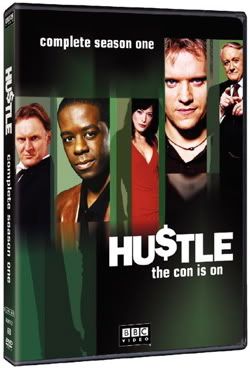 VAUGHN: He’s listed as a guest star on the last show we did for the season. Of the 24 shows we’ve done we filmed 2 in America, one in Las Vegas and one in Los Angeles. The one from Los Angeles, RJ, as he’s called by his friends, was a guest star on the show. And we used him in connection with the publicity of the show because I’ve known him since he married Natalie Wood the first time. So they put us all on shows, like The View, where we were brought out as a team.
VAUGHN: He’s listed as a guest star on the last show we did for the season. Of the 24 shows we’ve done we filmed 2 in America, one in Las Vegas and one in Los Angeles. The one from Los Angeles, RJ, as he’s called by his friends, was a guest star on the show. And we used him in connection with the publicity of the show because I’ve known him since he married Natalie Wood the first time. So they put us all on shows, like The View, where we were brought out as a team.
STIPP: I’m fascinated by the show’s ethos, that you hustle those who don’t deserve it.
VAUGHN: One of the things I learned early on in the first season of the show, and I came in three days after they had started shooting, is that when I started reading about people who have been hustled out of large amounts of money, wealthy people, never report it to police…out of embarrassment. These people, most of them, made their money by their wits and they don’t want made known that they’ve been outwitted.
STIPP: So, do you think that’s the allure, that there are people who operate outside of the law, like modern day Robin Hoods, righting wrongs?
VAUGHN: Yeah, the fact that they are living at the highest level possible when they are successful and, when they are not successful, are trying to scrape by, which we have done in the series. We have done shows where living conditions dropped dramatically because they had not been successful, recently, with conning people.
[Laughs]
Kind of like any job.
STIPP: How do you keep things fresh without it seeming gimmicky?
VAUGHN: It’s exactly as you mentioned earlier. It’s not like American television where you have to come up with 20 plus episodes with 20 plus scenarios for one season. It’s much easier for the producers to come up with 6 as opposed to 24.
STIPP: How have you seen these characters evolve?
VAUGHN: I think they got lucky. Casting is everything in TV as it is in movies. If there’s something wrong with 1 or 2 people in the cast, the show doesn’t work. Television is all about attracting people to the personalities within the show. And everybody seemed to like all of us. The black guy who was in the first three seasons, Adrian Lester, he was referred to as the black Olivier in England. He’s the star of theater, he’s done everything and had a huge following even prior to getting into HUSTLE. Marc [Warren] was on his way up and is famous because of this show. He had done some wonderful things prior to this, character work, he had never done something so consistent. And Jamie [Murray], who’s a very pretty girl, and looks like she’s Eurasian, she’s one hundred percent Irish. So, we’ve all caught on.
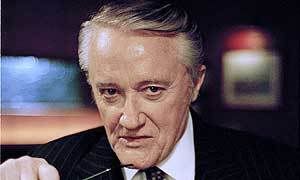 One strange thing, and I did come into things one week after they started shooing the show, that happened after I began my work was that I started receiving these messages from these people I’ve come to know over the years, largely press people. They all wanted to know about my character, what I thought about it, what research I’ve done on it. And I explained exactly as I just told you, there was no research, I came in at the last minute. I’m getting all these questions and it was then when I started to talk, to myself, and said, “I’ll just make something up.†It was then when I said to people that, “Oh, it’s really like if Napoleon Solo from MAN FROM U.N.C.L.E. went and retired on his government pension but all those years of being exposed to jewelry and wealth and beautiful cars and beautiful women and casinos all over the world, like James Bond, realizes he can’t live on his pension. So, what they do would be in the confines of the law…†I was just making it up as I was going along. Everybody wrote it down as what was going on with my character.
One strange thing, and I did come into things one week after they started shooing the show, that happened after I began my work was that I started receiving these messages from these people I’ve come to know over the years, largely press people. They all wanted to know about my character, what I thought about it, what research I’ve done on it. And I explained exactly as I just told you, there was no research, I came in at the last minute. I’m getting all these questions and it was then when I started to talk, to myself, and said, “I’ll just make something up.†It was then when I said to people that, “Oh, it’s really like if Napoleon Solo from MAN FROM U.N.C.L.E. went and retired on his government pension but all those years of being exposed to jewelry and wealth and beautiful cars and beautiful women and casinos all over the world, like James Bond, realizes he can’t live on his pension. So, what they do would be in the confines of the law…†I was just making it up as I was going along. Everybody wrote it down as what was going on with my character.
STIPP: Was that part of the appeal? That could you revisit this sort of debonair kind of character?
VAUGHN: I get scripts every year…Usually after 10 or 15 pages I close it. But I got sent three shows from a production company, called SPOOKS or MI-5 here, that company produced that show. I read the first script for the show and I continued to read the other two and my wife has never seen me read something like this all the way through. I said, “This is something really different.†My guess was right. Sometimes your guess can be wrong but I guess if everybody guessed right there’d be more shows on the air.
STIPP: Are the English different when it comes to what they like out of their television? I guess you could see it from a sociological point of view and see what the two cultures really value but do they respond to things differently?
VAUGHN: Well, the English seem to respond to our comedies but we don’t respond to all of theirs. Usually, comedies are harder to translate from one culture to the next but that’s not the case in England with what America exports over there. Or, in the case of ALL IN THE FAMILY, that was originally a British show.
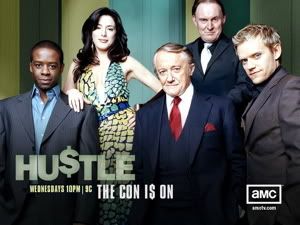 STIPP: Good point. Now, if you try and compare apples to apples, not that you can do it exactly, but you had a spate of con shows debuting on a variety channels here in America. I’m thinking of Ray Liotta’s failed show and the failed show on ABC, THE KNIGHTS OF PROSPERITY. What was the angle that made this show really connect with the audience?
STIPP: Good point. Now, if you try and compare apples to apples, not that you can do it exactly, but you had a spate of con shows debuting on a variety channels here in America. I’m thinking of Ray Liotta’s failed show and the failed show on ABC, THE KNIGHTS OF PROSPERITY. What was the angle that made this show really connect with the audience?
VAUGHN: I just don’t know. If I did know I could be a mega producer like Dick Wolf and be a billionaire. He’s the one who obviously knows because he has a formula that works.
STIPP: The producers of HUSTLE tip their caps to the older productions like THE STING and even recent movies like OCEAN’S ELEVEN.
VAUGHN: Well, that’s exactly the case of my television show, MAN FROM U.N.C.L.E., which rode the crest of the first three James Bond movies and it came on just as the third movie opened. There was just a huge interest in secret agents and spying.
STIPP: Is there something to when people that the element of luck has something to with the success of a particular program?
VAUGHN: I’m writing an autobiography and it was just last week…David McCallum, who was my co-star on U.N.C.L.E., they’re putting a DVD of all four seasons, and Warner Brothers, who are putting out the DVDs asked us to be sat down and be interviewed for this. It lasted about three hours and it was because of this where I went and thought about why U.N.C.L.E. was as successful as it was, when it was. There were a number of reasons. Mainly, it was because of the success of the Bond pictures. Next, David and I were successful in engaging a young audience. And, the next most important reason was the time slot. Because, when we went on the air, in 1964 we were on the verge of being cancelled two months after we started because our Nielsen ratings were so low. They changed our time slots from Tuesday night to Monday night but one of the things about that is that the show caught on with college students who were away at school. In those days, in regular houses, there was just one black and white set so when they came back, during the holidays, they were the ones controlling what was being watched.
 And so, the ratings suddenly went through the roof and, by the summer, when they re-ran the entire first season, it wound up being the number one show in the country almost a year after it almost canceled. It was mostly all due to college students and it the time slot was moved once more accordingly and the show remained a huge hit.
And so, the ratings suddenly went through the roof and, by the summer, when they re-ran the entire first season, it wound up being the number one show in the country almost a year after it almost canceled. It was mostly all due to college students and it the time slot was moved once more accordingly and the show remained a huge hit.
STIPP: It’s just these little things that contribute to the overall success and not just one big factor.
VAUGHN: I said yesterday when I was being interviewed for the U.N.C.L.E. DVD that this would not have happened in modern television. If the show is not a hit within the first two airings it is off the air. If the show, if U.N.C.L.E. would have been released now it would have been off the air permanently by October because networks do not take chances like that anymore.
STIPP: How does that sit with you now? That there a possible gems that are simply not given enough room to find an audience?
VAUGHN: And sometimes they’re not the most miserable show, either, but they’re put in one of the most miserable time slots. I mean ALL IN THE FAMILY is a good example of that. They did three pilots before they went on the air before they even had a crack at success. Everyone was terrified of that premise…glorify a bigot. But Norman [Campbell] kept coming back because he believed in it. The question of how long you’re willing to hang around, if you’ve got the money as Norman did, you’ve got to consider there are lot of other factors at play. In U.N.C.L.E., David had the ability to attract young girls and I attracted the older women, the women in their 20’s.
[Laughs]
STIPP: One of the other things I’ve found is that some really good television actors have, at one time, been good doing traditional theater. Have you found that to be the case?
VAUGHN: Yeah, very much so. Before movies, before talkies even, almost any actor could be put up on screen but once talkies started to come into play there was a rush to hire traditionally trained actors because there’s a famous story about Valentino opening his mouth for the very first time on the screen and out came [in a high pitched squeal], “Hi, my name is…â€
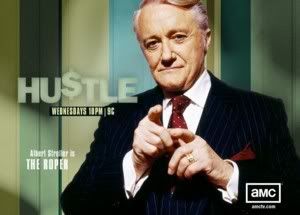 [Laughs]
[Laughs]
But that was the reason why there was a rush to get well-trained actors on the screen. The whole dynamic changed.
STIPP: In your fifty years as an actor you could be out enjoying your accomplishments away from the lens of a camera. What keeps you coming back?
VAUGHN: Well, I’ve played Hamlet three times, I’d play Hamlet a 100 times if I wasn’t so old but it is the most extraordinary role ever written in the English language for an actor to play. But all my children are grown, I have a lovely home in the Connecticut countryside and I don’t leave it that often but when I find something that I like I leave it because I still enjoy doing the actual process of acting.
As long as I am ambulatory I will be out there acting wherever I can.
[Laughs]
STIPP: That’s about as good as an end as there is. Thank you, Robert.
Comments: None
Leave a Reply |








